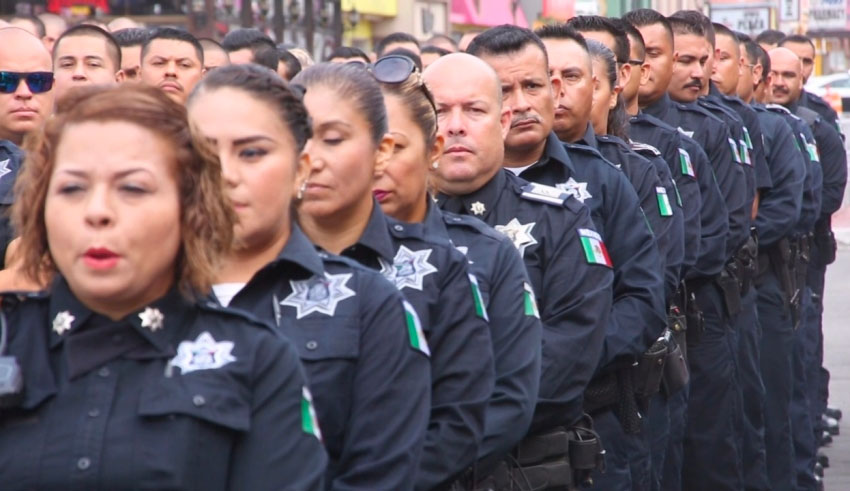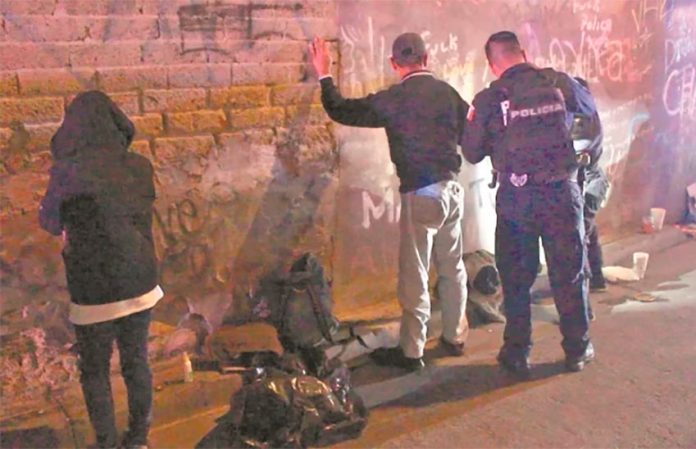Drug dealers in Tijuana are more likely to be killed than go to jail.
Official statistics show that police arrested 12,308 people in possession of illegal drugs in the northern border city between June 2016 and August 2019, a period that coincides with the first three years of the operation of the new accusatory criminal justice system.
Many were in possession of quantities of narcotics – most commonly methamphetamine and marijuana – well above established personal use limits. More than a third of those detained had previously been arrested, some as many as 13 times.
Yet not a single person among the more than 12,000 arrested was convicted of drug trafficking.
Only one in 10 of those arrested appeared before a judge and just 182 people – 1.5% of the total detained – received prison sentences. However, they were found guilty of drug possession rather than trafficking, and accordingly received lighter sentences.
In the courts of Tijuana, it appears that there is no “real fight” against drug trafficking, according to an investigative report published by the newspaper El Universal. The low conviction rates have allowed the border city to come close to becoming the drug dealing capital of Mexico, the report said.
“The [criminal justice] system has collapsed,” said one judge who asked not to be identified.
Judges and prosecutors alike say that one of the main reasons why cases against suspected drug dealers fail is because irregularities are detected in their arrest and/or the official reporting of their detention, something that is frequently cited as justification for the release of alleged criminals.
For their part, police in Tijuana say that judges are favoring the human rights of criminals over those of their victims.
“It’s the Achilles heel of our laws and the citizens affected,” said municipal police supervisor Francisco García. “It turns out that the person who burglarized my house has more rights than me.”
However, illegal arrests and the alleged preferential treatment of suspected criminals are not the only reasons why so many drug dealers have been returned to the streets of Tijuana.

The high number of drug-related cases in the city and a lack of resources in the justice and prison systems means that many cases aren’t even heard in court and when they are, judges often impose fines rather than custodial sentences.
Many experts say that the new justice system, not just in Tijuana but across Mexico, is akin to a revolving door.
“The justice delivery chain in Tijuana is broken,” said the report, which is part of an investigative journalism project on the northern border that is supported by the International Center for Journalists.
One person who serves as a typical example of the thousands who didn’t face any legal consequences after they were arrested in possession of drugs is a man identified only as Federico. The factory worker (and alleged dealer) was detained in possession of 36 grams of methamphetamine wrapped in 91 separate packages.
The amount is 900 times higher than the 40 milligrams that the General Health Law permits for personal use. Nevertheless, law enforcement authorities in Tijuana failed to present sufficient evidence to prove that Federico was a drug dealer.
Two days after his arrest, he was released on the condition of abstaining from the use of drugs, maintaining employment and not absconding.
Federico’s story is “systematically repeated” in Baja California courts, the investigative report said, adding that “suspected drug dealers enter [custody] but leave without severe penalties … leading Tijuana into a spiral of violence that appears to have no end.”
In the same three-year period in which the vast majority of people found in possession of drugs got off scot-free, there were 6,190 homicides in Tijuana, official statistics show.
The vast majority of deaths in Tijuana, including the murders that continue to plague the city, are related to drug trafficking, said Tijuana-based state prosecutor Jorge Álvarez.
Federal Security Secretary Alfonso Durazo pointed out in December that there were more homicides in Tijuana last year than in any other municipality in the country.
Former Tijuana police chief Mario Martínez said that between 80% and 85% of the insecurity problems in the city are linked to drug trafficking.
The fact that most people caught in possession of drugs are released in 48 hours is “sad” and a “mockery,” he said.
Security and law enforcement officials say that the most common victims of homicides are drug dealers caught in the middle of confrontations between rival cartels that operate in Tijuana. Their turf war plays out on the city’s streets, on corners where drugs are sold and in parks.
Accordingly, in areas where the arrest rate for drug possession is high, so too is the murder rate. Most victims are aged between 25 and 35.
One of them was Federico. When he was released, authorities predicted that he would go back to drug dealing and eventually be killed, the investigative report said, adding that “the death sentence was fulfilled.”
Federico was found dead on December 27, 2019 in a Tijuana picadero, as places where addicts shoot up drugs are colloquially known. Six days before the discovery of his body, the factory worker-cum-dealer was beaten to death in a Tijuana neighborhood next to the one where he lived, according to local authorities.
His death, the investigative report said, is proof that crime moves much faster than justice in the northern border city, a hub of drug trafficking, violence and impunity.
Source: El Universal (sp)
